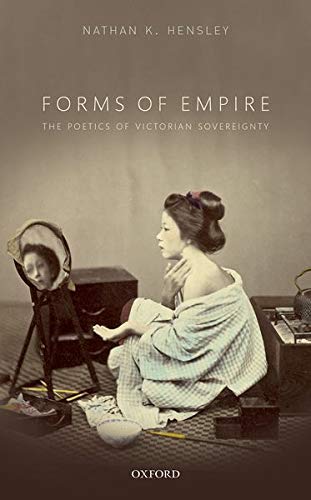All books / Book
Forms of Empire: The Poetics of Victorian Sovereignty

| Full title: | Forms of Empire: The Poetics of Victorian Sovereignty |
|---|---|
| ISBN: | 9780198792451 |
| ISBN 10: | 019879245X |
| Authors: | Hensley, Nathan K. |
| Publisher: | Oxford University Press |
| Edition: | Illustrated |
| Num. pages: | 320 |
| Binding: | Hardcover |
| Language: | en |
| Published on: | 2017 |
Read the reviews and/or buy it on Amazon.com
Synopsis
What Is The Difference Between Peace And War? In This Far-reaching And Provocative Study, Nathan K. Hensley Shows How The Modern State's Anguished Relationship To Violence Pushed Literary Writers To Expand The Capacities Of Literary Form. The Victorian Era Is Often Imagined As An 'age Of Equipoise,' But The Period Between 1837 And 1901 Included More Than Two Hundred Separate Armed Conflicts: The First Liberal State In History Brought The World To Order With Hands Stained In Blood. Hensley Unpacks The Seeming Paradoxes Of The Pax Britannica's Endless War By Showing That The Equipoise Of The Victorian State Depended On Physical Force To Guarantee It. While Inherent To All Law, Sovereign Violence Shuddered Most Visibly Into Being At The Edges Of Law's Reach, In The Empire, Where Emergency Was The Rule And Death Perversely Routinized. Hensley Tracks Some Of The Era's Most Astute Literary Thinkers-george Eliot, Charles Dickens, Wilkie Collins, A.c. Swinburne, H. Rider Haggard, And Robert Louis Stevenson Among Them-as They Generated Techniques Of Representation That Might Account For Fact That An Empire Built On Freedom Had The Threat Of Death Coiled At Its Very Heart.0free Indirect Discourse, Lyric Tension, And The Category Of Novelistic Action Itself: These And Other Seemingly 'aesthetic' Matters, Hensley Shows, In Fact Mediate A Problem That Was Finally Political, Yet Unthinkable From Within The Assumptions Of Orthodox Victorian Theory. In Contrast To The Progressive Idealism That Remains Our Common Sense, The Writers At The Core Of Forms Of Empire Moved Beyond Embarrassment And Denial In The Face Of Modernity's Uncanny Relation To Killing. Drawing On Robust Archival Work, Careful Literary Analyses, And A Theoretical Framework That Troubles The Distinction Between 'historicist' And 'formalist' Approaches, Forms Of Empire Links The Victorian Period To The Present And Articulates A Forceful Vision Of Why Literary Thinking Matters Now. Introduction: Reading Endless War -- Part. I. Equipoise: 1. Time And Violence In The Age Of Equipoise ; 2. Reform Fiction's Logic Of Belonging -- Part Ii. And Elsewhere: 3. Form And Excess, Morant Bay And Swinburne ; 4. The Philosophy Of Romance Form -- Conclusion: Endless War Then And Now. Nathan K. Hensley. Includes Bibliographical References (pages 275-296) And Index.